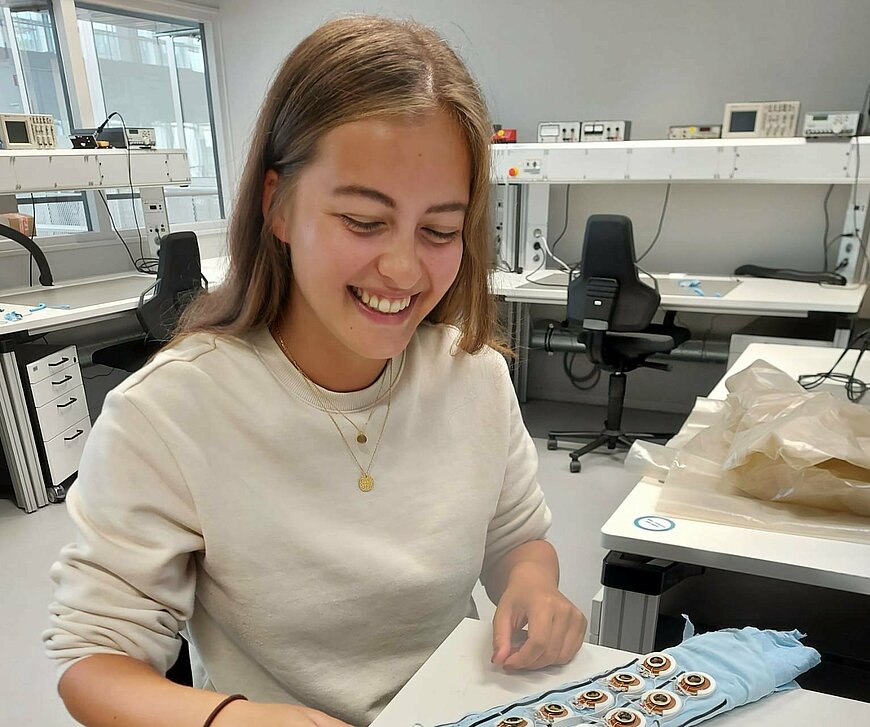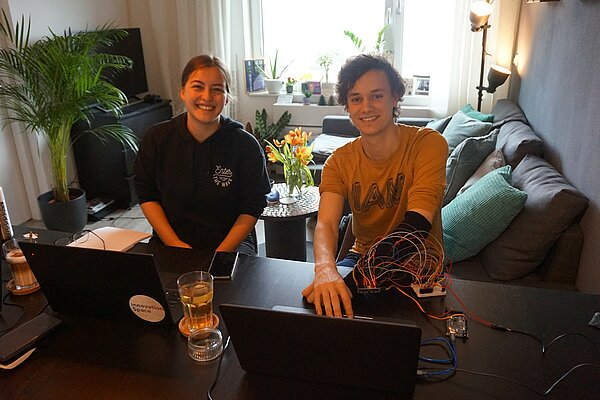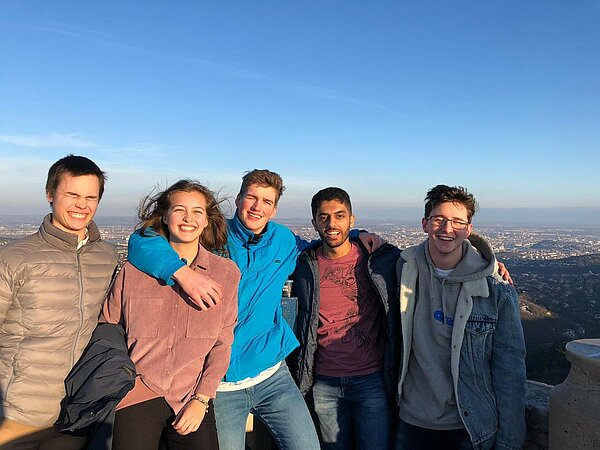Meet our pioneer: Julie van der Hijde

In Brainport Eindhoven we change the world because here we develop key technologies that change society. We can only do that because of our pioneers. Therefore, we would like you to meet one of our pioneers: Julie van der Hijde.
Who are you?
My name is Julie van der Hijde and I’m 22 years old. I was born in Eindhoven and I moved to Breda when I was six. But since the start of my studies I have been living in Eindhoven again, first in a student house and for six months now in an apartment.
What do you study?
I’m in the third year of my bachelor’s Innovation Sciences, Psychology & Technology, specializing in Robotics at TU/e. I really enjoy being technical, but studies such as Electrical Engineering and Mechanical Engineering were too technical for me. At Psychology & Technology, you also take a lot of technical courses from the Electrical Engineering faculty, but I also learn things about people. For example, I got an introductory course in psychology, about how people behave in groups, and what human factors are, so where the limits of people lie. Then you can include those things in the design of new technology. So in addition to the technical aspect, you also look at the human aspect.
Why did you choose TU/e?
First of all, I wanted to go to a technical university and I was always impressed by student teams. You don't have that in many places in the Netherlands. In addition, the study I ultimately chose was very unique in the Netherlands and was not given anywhere else, so that also made the choice easier.
"I was always impressed by student teams. You don't have that in many places in the Netherlands."
Julie van der Hijde
Why did you choose this study?
I wanted to be technical myself, but I also think it’s very important to look at the human side. There are plenty of examples of technical things that are poorly designed, just think of a microwave with a thousand buttons that you don't understand. Then no thought has been given to the people who are going to use it and should understand it right away without too much effort. That's what I really enjoy about my study and that's also the reason that I started doing it. New technologies are super important and cool to work on, but it's also very important to think about how people interact with that technology and how you make sure you can design technology well for people.
I have a very broad interest and in high school, I didn't know what I wanted to do. I did a profile assignment and I thought it would be great fun to watch care robots because I had seen videos of that before. For example, I came into contact with a care home and I investigated how the elderly react to a small care robot such as Nao. How they reacted was very special to see, because you might think that the elderly and new technology don't go well together. But it was nice to see that all the elderly, including the elderly with dementia, cheered up as soon as they saw the robot. It touched me a lot when I saw that many elderly people sat very still in a chair, and didn't seem to be able to do much else. But the people who first only sat quietly in their chairs were also excited when the robot started singing old-fashioned songs. That was so cool and beautiful to see. I wanted to go to a technical university anyway and when I came across this study, which seemed to match my profile paper well, I decided to do it.
"New technologies are super important and cool to work on, but it's also very important to think about how people interact with that technology and how you make sure you can design technology well for people."
Julie van der Hijde
Are you going to do a master's after this?
In February I will finish my bachelor’s and then I want to do a master’s. I still doubt a little about it. It will probably be Human-Technology Interaction, which is the postgraduate course of Psychology & Technology or something in the direction of Neuroscience or Neural Engineering.

Did you experience some study delay because you’ll finish in February?
In the first year, I didn't get anything in the first quartile. I was living at home at the time and had to travel for quite some time. In addition, I wanted to play rugby and I dance twice a week and dance and I also had to get used to learning at uni. I was way too excited and wanted to do everything, and it just didn't work out. After I moved to Eindhoven, I completely recovered and passed all courses.

What student team are you in?
I'm in Team HART. In the team, I’m mainly in the marketing & awareness team, and I work on development. In development, I contributed to the hardware in the beginning. At first, I thought it would be interesting to just try it out, but that's not my thing. So what I'm doing now is making the sleeve myself. I also ensure that the motors remain in the right place, that the electronics are properly incorporated and that the sleeve feels pleasant to the user. I then think about whether it makes sense for the user how to put it on the sleeve. Should it be on the left arm or the right arm, is it the top or bottom? With another teammate, I am working on making a nice product out of it.
And what I do in marketing is mainly to create more awareness for the subject of Team HART. For this, I set up a collaboration between the technasium and our team. As a student team, we now also deliver assignments to various schools, so that the students there learn more about human augmentation so that we ensure that people become more familiar with the subject. In secondary school, I also did technasium for six years and I learned a lot from that. So I thought it would be great to involve technasium students in our project.
Why do you work in this team?
I wanted to join a student team. In high school, I already knew I wanted to go to TU/e because there are so many student teams, all of whom do cool things. For example, a long time ago I saw the Solar Team Eindhoven on the news and that certainly made a big impression at the time. I thought it would be cool to be part of such a team. I also really enjoy working on a technology myself that contributes to the future. So in my third year, I decided to join a student team. I specifically chose this team because I'm very interested in how the brain works, neuroscience and neural engineering, and this is the first team at the university that aligns with these interests.
"I thought it would be cool to be part of such a team. I also really enjoy working on a technology myself that contributes to the future"
Julie van der Hijde
What do you want to do next?
I enjoy working on new technology. During my studies, I discovered that I also really like the Neuroscience direction. My interests are very broad, so I find it very difficult to say exactly what I want to do. Along the way, I just have to find out where I end up. I would like to do research, but I would also like to be more practical.
Doing a PhD is an option. If I want to become a researcher, a PhD is the perfect start. There you learn to conduct research independently or in a team. There is also a chance that you will become an assistant professor.
I have always liked education and I have also thought about becoming a teacher at a secondary school. The nice thing about it is that you are the person who tries to guide or teach others. That you can interest others in your profession based on your interests. You also notice that if you are taught by someone with a passion for his or her profession, it immediately makes the lessons much more interesting.

What do you find important about a later job?
I want to work on new technologies and with that, I also want to think about the people who are going to use that, what you do for them.
I've always liked a lot of things and I'm not quite sure where I want to go yet. But I would like it in a future job if I can work together with other people on projects so that you get knowledge from everywhere.
The student team has a flat structure, so there’s no single board that makes all decisions. Everyone has input. Whether that's necessarily the best way, I'm not sure, but I enjoy seeing his opinion voiced, and valued, and factored into decisions. That would also be interesting in a future job.

What do you think about studying and living in Brainport Eindhoven?
I enjoy being back in Eindhoven and being here at the university. You get to know a lot of people with the same interests and through student teams, for example, you come into contact with students from completely different disciplines. I also really like that there are many international students. I made many new international friends. This way you get to know a lot of other cultures and that is very interesting. You don't stay in one bubble that way.
Eindhoven is also simply the region where a lot of new techniques and cutting edge things come from. It's very cool to live in the middle of that. For example, Lightyear, which originated from a student team. I think it's cool that I'm also in a student team in this region.
In my opinion, Brainport Eindhoven is the region of innovation in the Netherlands. So many cool technologies come from here. Everyone also tries to work for a better future and that makes this region very special.
Would you like to tell other or future students in Brainport Eindhoven even more?
I found it quite exciting to come here. One of the reasons was that I would be a girl at a technical university where there are a lot of men and so as a woman you are in the minority anyway. That felt quite different to me, compared to the ratio in high school. I also found it quite scary to do a technical study. I wasn't sure I could do it either, because I always had to work hard in high school. But I just really wanted to and that's why I went to university here. Now I've also found out that I can do it just fine and that I'm in the right place here, and I like what I'm doing. So my message I think is: if you work hard and do what you like then you will get there.
"Brainport Eindhoven is the region of innovation in the Netherlands. So many cool technologies come from here. Everyone also tries to work for a better future and that makes this region very special."
Julie van der Hijde
Did you get used to being a girl at TU/e?
I felt quite at home there quite quickly. In my study, the male/female distribution is fairly even. So there you don't notice the difference with a fairly equal distribution in secondary school anyway. I also didn't have to get used to the other distributions here, but I was afraid of that beforehand. In addition, it is nice in projects, for example, that as a girl you often have a completely different view of things.